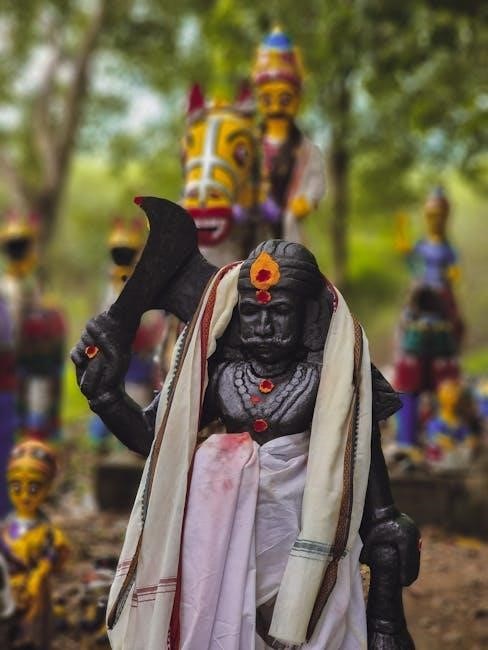Title: Understanding “Things Fall Apart”: A Comprehensive Analysis
“Things Fall Apart” by Chinua Achebe is a seminal work of African literature, exploring cultural identity, colonialism, and tradition through the story of Okonkwo in pre-colonial Nigeria.
“Things Fall Apart” introduces readers to the rich cultural tapestry of pre-colonial Nigeria, exploring themes of identity, tradition, and change through the lens of Okonkwo’s journey, providing deep historical insight.
2.1. Overview of the Novel
“Things Fall Apart” by Chinua Achebe is a groundbreaking novel set in pre-colonial Nigeria, exploring the complexities of Igbo culture and the clash of traditions with colonialism. The story follows Okonkwo, a proud and complex protagonist, as he navigates societal expectations, personal struggles, and the arrival of British rule. The PDF version of the novel remains widely popular for its accessibility and vivid portrayal of cultural identity, making it a timeless classic in world literature.
2.2. Importance of the PDF Version
The PDF version of “Things Fall Apart” offers unparalleled accessibility and convenience, enabling readers to engage with Achebe’s seminal work anytime, anywhere. Its digital format allows for easy highlighting, searching, and referencing, making it a preferred choice for students and scholars. The PDF also ensures the novel’s timeless themes reach a broader audience, preserving its cultural significance in the digital age.
Background of the Novel
“Things Fall Apart”, written by Chinua Achebe in 1958, is a groundbreaking novel set in pre-colonial Nigeria, exploring themes of cultural identity, tradition, and colonial disruption, resonating globally.
3.1. Author Chinua Achebe: A Brief Biography
Chinua Achebe, born on November 16, 1930, in Ogidi, Nigeria, was a renowned novelist, poet, and critic. His debut novel, Things Fall Apart, published in 1958, became a cornerstone of modern African literature. Achebe’s work often explores themes of cultural identity, colonialism, and tradition. He passed away on March 21, 2013, leaving a legacy as a literary giant.
3.2. Historical Context: Pre-Colonial Nigeria
Pre-colonial Nigeria was characterized by diverse ethnic groups, each with distinct cultures and governance systems. The Igbo people, central to Things Fall Apart, lived in decentralized villages with a complex societal structure. Their society emphasized individual achievement, communal decision-making, and spiritual beliefs tied to nature and ancestors, forming the backdrop for Okonkwo’s story.
Plot Summary
Things Fall Apart traces the rise and fall of Okonkwo in pre-colonial Nigeria, exploring his struggles with tradition, family, and the arrival of colonialism that reshapes his world.
4.1. The Rise of Okonkwo
Okonkwo emerges as a formidable figure in Umuofia, earning respect through his wrestling prowess and strong work ethic. He rises from a disadvantaged childhood, shaped by his father Unoka’s laziness, to become a wealthy farmer and respected leader. His achievements solidify his reputation as a man of strength and tradition, embodying the ideals of his community.
4.2. The Fall of Okonkwo
Okonkwo’s downfall begins with his exile after accidentally killing a clansman. His return finds Umuofia colonized, eroding traditional values. His rigid adherence to custom clashes with change, leading to tragic consequences. The destruction of his yam farm and the loss of his daughter further unravel his world. His eventual suicide marks the end of his once-prominent status and the collapse of his resistance to colonial forces.
4.3. The Colonization of Umuofia
The colonization of Umuofia unfolds with the arrival of British colonizers, disrupting the Igbo way of life. Christianity is introduced, dividing the community and weakening traditional practices. The colonial administration imposes foreign governance, clashing with Igbo leadership. Economic and social structures are altered, leading to resistance and eventual decline of traditional norms, forever changing the village’s fabric and cultural identity.
Major Themes
Cultural conflict, masculinity, and tradition vs. modernity are central themes, exploring the clash between Igbo traditions and colonial influences, while examining identity and societal transformation in Nigeria.
5.1. Cultural Conflict and Identity
Cultural conflict and identity are central to the novel, as Okonkwo and his community grapple with the imposition of colonialism and Christianity. The Igbo people’s traditional values clash with external forces, leading to internal strife and a crisis of identity. This tension reflects the broader struggle of preserving cultural heritage in the face of modernity and external domination, shaping the characters’ experiences and societal dynamics.
5.2. Masculinity and Tradition
Okonkwo’s rigid adherence to Igbo masculinity and tradition drives his identity but also leads to his downfall. The novel portrays how societal expectations of strength and dominance can both define and destroy individuals. Achebe critiques the rigid gender roles and the fear of appearing weak, highlighting the tension between tradition and the changing world, which ultimately isolates Okonkwo and fractures his relationships.
5.3. Tradition vs. Modernity
Tradition and modernity clash in Achebe’s portrayal of Igbo society under colonial influence. The arrival of Christianity and Western values disrupts long-standing customs, creating internal conflict within characters like Nwoye, who seeks change, while Okonkwo resists it. This tension reflects broader societal transformations, as traditional norms are challenged by external forces, leading to cultural fragmentation and the erosion of communal identity.

Symbolism in the Novel
Symbols in “Things Fall Apart” enrich the narrative with deeper meanings, such as yams representing masculinity and strength, and the egwugwu embodying ancestral authority and tradition.
6.1. The Title: Reference to Yeats’ Poem
The title “Things Fall Apart” is borrowed from W.B. Yeats’ poem “The Second Coming,” symbolizing chaos and disintegration. Achebe uses it to mirror the collapse of Igbo culture under colonial influence, reflecting themes of societal unraveling and cultural dislocation in the novel.
6.2. Symbolic Elements: Yams, Egwugwu, and the Oracle
Yams symbolize masculinity, strength, and prosperity in Igbo culture, reflecting Okonkwo’s identity. Egwugwu represents ancestral spirits, embodying cultural and spiritual authority. The Oracle, a divine voice, guides the community but also contributes to Okonkwo’s downfall, highlighting the tension between tradition and change.
These elements weave together to illustrate the cultural fabric and its disintegration under colonial influence.

Character Analysis
The novel explores complex characters like Okonkwo, Unoka, Nwoye, and Ezinma, each representing distinct struggles with masculinity, tradition, and identity amidst cultural upheaval and personal tragedy.
7.1; Okonkwo: The Tragic Hero
Okonkwo, the protagonist, embodies a tragic hero, driven by pride and fear of weakness. His rise in Umuofia is marked by strength and achievement, but his downfall stems from unresolved issues with his father, rigid adherence to tradition, and the societal changes brought by colonialism, leading to a devastating conclusion that reflects the broader cultural collapse.
7.2. Unoka: The Father’s Legacy
Unoka, Okonkwo’s father, is a man of weakness in the eyes of Umuofia. His love for music and storytelling contrasts sharply with Okonkwo’s rigid masculinity. His legacy of debt and failure haunts Okonkwo, fueling his determination to avoid his father’s mistakes. Unoka’s gentle nature and lack of material success shape Okonkwo’s identity and drive his quest for strength and respect.
7.3; Nwoye and Ezinma: The Next Generation
Nwoye and Ezinma represent the future of Umuofia, embodying change and resilience. Nwoye, Okonkwo’s son, struggles with his father’s expectations, seeking a different path. Ezinma, Okonkwo’s daughter, shows strength and independence, challenging gender norms. Together, they symbolize the potential for transformation and adaptation in a society facing colonial disruption and cultural shifts. Their stories highlight the tension between tradition and modernity.
Cultural Significance
“Things Fall Apart” is a cornerstone of African literature, challenging colonial narratives and offering a authentic Igbo perspective. It has reshaped global perceptions of African culture and identity, becoming a powerful symbol of resistance and resilience in post-colonial discourse.
8.1. Impact on African Literature
“Things Fall Apart” revolutionized African literature by presenting authentic Igbo culture, challenging stereotypes, and inspiring a new wave of African writers. It shifted the narrative from colonial perspectives, offering a voice to marginalized communities and setting a benchmark for post-colonial storytelling. Its influence extends globally, making it a foundational text in literary studies and cultural discourse.
8.2. Representation of Igbo Culture
“Things Fall Apart” offers a vivid portrayal of Igbo culture, detailing its rich traditions, social structures, and spiritual beliefs. Achebe highlights the complexity of Igbo society, challenging colonial stereotypes and presenting a balanced view of pre-colonial Nigeria. The novel showcases the communal values, rituals, and the Igbo worldview, providing a powerful counter-narrative to dominant colonial depictions of African cultures.

Reception and Criticism
“Things Fall Apart” received widespread acclaim for its profound portrayal of African culture and critique of colonialism. However, some critics argue it perpetuates negative stereotypes of African societies.
9.1. Positive Reception: Acclaim and Awards
“Things Fall Apart” received widespread critical acclaim, praised for its vivid storytelling and cultural depth. It earned Chinua Achebe numerous awards and recognition, solidifying its place as a cornerstone of African literature. The novel’s PDF version remains widely accessed, enhancing its global reach and educational impact.
9;2. Criticisms and Controversies
Despite its acclaim, “Things Fall Apart” faced criticism for its perceived negative portrayal of Igbo traditions and Christian influences. Some accused Achebe of reinforcing colonial stereotypes. Additionally, debates arose over the novel’s PDF distribution, with concerns about piracy and unauthorized sharing impacting its intended cultural and educational dissemination.
The PDF Version
“Things Fall Apart” in PDF format enhances accessibility, offering a convenient way to explore Achebe’s exploration of cultural identity and colonialism. Its digital form ensures global reach and ease of study, making it a popular choice for scholars and readers worldwide.
10.1. Popularity of the PDF Format
The PDF format of “Things Fall Apart” is highly sought after for its portability and readability. Readers appreciate the ability to access the novel on various devices without losing formatting. Its widespread availability online has made it a preferred choice for students and enthusiasts, ensuring Achebe’s timeless story reaches a broader audience globally;
10.2. Features of the PDF Edition
The PDF edition of “Things Fall Apart” offers enhanced readability with clear fonts and well-structured chapters. It includes bookmarks for easy navigation and search functionality for quick access to specific sections; The format preserves the original text’s integrity, making it ideal for academic purposes and personal reading, while ensuring compatibility across all digital devices seamlessly.
10.3. Accessing the PDF: Legal and Ethical Considerations
Accessing the PDF of “Things Fall Apart” requires adherence to copyright laws. Downloading or sharing the PDF without authorization is illegal and unethical. Purchasing from authorized sources ensures fair compensation to the author and publisher, promoting literacy and supporting creative work. Always opt for legal and ethical access to respect intellectual property rights and uphold literary integrity.
Teaching the Novel
Teaching “Things Fall Apart” involves integrating cultural context, thematic analysis, and historical insights to foster critical thinking and empathy among students, enhancing their understanding of colonial impacts and identity.
11.1. Curriculum Inclusion
Incorporating “Things Fall Apart” into school curricula enhances cultural understanding and aligns with educational standards. Its themes of identity, colonialism, and tradition foster critical thinking and empathy, making it a valuable resource for diverse classrooms. The novel bridges cultural divides, offering students insights into African heritage and the impacts of colonialism, enriching their global perspective and literary appreciation.
11.2. Study Guides and Resources
Study guides for “Things Fall Apart” provide in-depth analysis, summaries, and discussion questions to enhance understanding. They include historical context, character insights, and thematic exploration. PDF versions are widely available, offering accessible learning tools. These resources cater to students and educators, facilitating comprehensive analysis and fostering deeper engagement with the novel’s rich cultural and historical significance.

Legacy and Adaptations
“Things Fall Apart” has left a lasting impact on world literature, influencing African storytelling and inspiring numerous adaptations, including films and TV series, cementing its cultural significance.
12.1. Lasting Impact on Literature
“Things Fall Apart” revolutionized African literature, challenging stereotypes and presenting authentic narratives. Its exploration of cultural identity, colonialism, and tradition has influenced countless writers globally, making it a cornerstone of postcolonial studies and a testament to Achebe’s enduring legacy in shaping modern literary discourse.
12.2. Adaptations: Film and TV Series
“Things Fall Apart” has been adapted into a 2016 Nigerian film, bringing Okonkwo’s story to life visually. Discussions about a TV series adaptation have also emerged, aiming to expand the novel’s reach. These adaptations highlight the enduring relevance of Achebe’s work, ensuring its themes resonate with modern audiences while preserving its cultural essence.
“Things Fall Apart” remains a profound exploration of cultural identity and colonialism. Its enduring relevance is evident in its themes and availability in PDF, ensuring accessibility for modern readers.
13.1. Summary of Key Points
“Things Fall Apart” explores cultural identity, colonialism, and tradition through Okonkwo’s story. The novel highlights the clash between Igbo traditions and European colonization, leading to societal upheaval. Its themes of masculinity, cultural conflict, and modernity remain relevant. The PDF version enhances accessibility, ensuring Achebe’s profound commentary on identity and history reaches a broader audience, solidifying its legacy in African literature.
13.2. Final Thoughts on the Novel’s Relevance
“Things Fall Apart” remains a foundational work in African literature, offering profound insights into cultural identity, colonialism, and tradition. Its exploration of societal upheaval resonates universally, making it a vital read for understanding historical and modern complexities. The novel’s legacy endures, inspiring reflection on cultural preservation and change, ensuring its relevance for future generations in both print and PDF formats.



